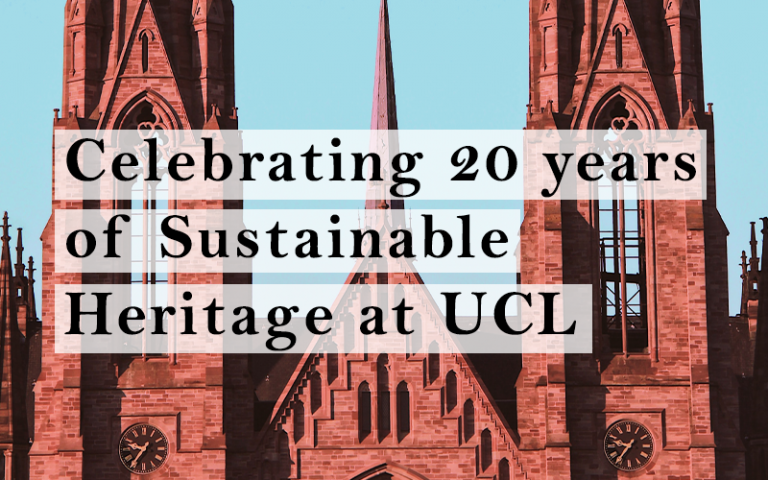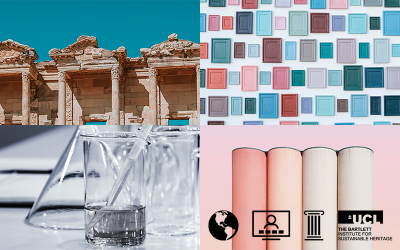Celebrating 20 years of Sustainable Heritage at UCL
1 March 2021
Today, as UCL Institute for Sustainable Heritage turns 20 years old, we look back over the Institute's history and milestones and welcome you to join our Bidecennial celebrations

Looking back on the last 20 years, and looking forward at the pressing global challenges faced by the heritage sector, we welcome you to join us in celebrating 20 years of Sustainable Heritage at UCL. To mark the occasion, the UCL Institute for Sustainable Heritage is hosting a Bidecennial Conference focussing on strategic research questions, open to all and broadcast globally online. Across four days visionary contributors will speak on the Institute’s main research themes of Heritage Risk and Resilience, Modern and Contemporary Heritage, Heritage Science and Future Heritage.
Recognising the need for a cross-disciplinary centre that brings together arts, humanities, social and heritage sciences on the 1 March 2001, under the original name of Centre for Sustainable Heritage, UCL Institute for Sustainable Heritage was launched in The Bartlett Faculty of the Built Environment. The Centre’s unique mix of expertise were instantly in demand in the heritage sector. Within its first six months it was commissioned by the European Parliament to investigate the technological requirements for solutions in conservation and protection of monuments and archaeological remains.
In the early days the Centre also took on a scoping study on climate change and the historic environment for English Heritage, the first study of its kind to evidence the concerns and observations of heritage site managers on the impact of climate change on historic buildings, collections and sites. This was a precursor to the EU Noah’s Ark project and the winning of the Europa Nostra Grand Prix for Research in 2009.
Renamed as the UCL Institute for Sustainable Heritage we know today, the Institute has continued to expand the horizons of heritage research. From pioneering olfactory heritage science with future involvement in the Odeuropa project to capture Europe’s lost scents using artificial intelligence, to advancing understanding on historic plastic degradation through the COMPLEX project, the Institute’s expertise and research capabilities are far reaching. The academic and research team use a range of theories and methods to address complex heritage challenges and address socially relevant questions for cultural heritage. Research areas have spanned microclimates, energy efficiency, heritage values, future heritage, fire in historic buildings, disaster resilience and much more.
Through its research-led teaching the Institute has also inspired a new generation of heritage leaders. The flagship Sustainable Heritage MSc was launched in 2002/03. Alumni from this programme and PhD graduates have gone on to work in a variety of renowned institutions, including the European Commission, UNESCO, the Canadian Conservation Institute, The National Trust, English Heritage, the Office of Public Works in Ireland and Historic England as well as going on to further academic research.
In 2019 the Data Science for Cultural Heritage MSc was launched, pioneering a new way of teaching data science through application in the cross-disciplinary context of heritage. In a time of unprecedented change the new Heritage Evidence, Foresight and Policy MSc is launching in October 2021 and will equip graduates with the capacity to anticipate and manage long-term change to create impactful policy that protects what society values.
A thriving PhD programme produces novel heritage research spanning topics from foreign cultural policy through the work of cultural institutions to quantitative chemical hyperspectral NIR imaging of historic cellulosic materials. A cornerstone of UCL ISH’s PhD programme is the Science and Engineering in Arts, Heritage and Archaeology SEAHA Centre for Doctoral Training (CDT) which was launched in response to the need to train interdisciplinary scientists and engineers in cultural heritage. The CDT, in partnership with the University of Oxford and University of Brighton, is funded by the Engineering and Physical Sciences Research Council (EPSRC) in 2014 until 2022.
Beyond their academic successes SEAHA students have become expert heritage science communicators, with a team of students winning a prestigious journalism award for science blogging from Association of British Science Writers in 2019. Using the CDT’s unique Mobile Heritage Lab, the students have been engaging the public in heritage science by visiting schools, museums, science festivals, conferences and historic sites such as Hampton Court Palace. Based at the UCL ISH, the ‘lab-on wheels’ boasts equipment covers different areas of heritage science interest, such as environmental monitoring, imaging and chemical analysis.
The Institute’s research and teaching are supported also by state-of-the-art Heritage Science Laboratories at the Bloomsbury and Here East campuses for studying heritage materials and environments with an array of spectroscopic techniques, hyperspectral imaging, and equipment to produce controlled change in samples (such as artificial ageing). The lab also boasts an impressive array of portable kit that is used for on-site investigation of heritage sites. An archive of reference historic sample materials is housed in the Bloomsbury lab as an invaluable source of study materials for collaborative, doctoral and Masters research projects. All laboratory work applies sustainable practices to allow research to be conducted in a resource efficient way, which was recognised with UCL’s Gold Sustainability Award in 2020.
We welcome those who have joined us throughout this journey, as well as those who are new to Sustainable Heritage at UCL, to join the celebrations this March.
 Close
Close


